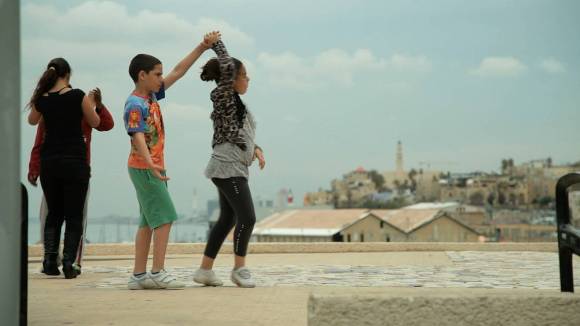
Dancing in Jaffa by Hila Medalia will be the opening film of the Docaviv International Documentary Film Festival. The film will be screened at the Port of Tel Aviv, and the festival will take place from May 2 – 11, 2013, with screenings taking place at the Tel Aviv Cinematheque, the Port of Tel Aviv, and Habima Square, with 12 films participating in the Israeli Film Competition.
Dancing in Jaffa represents a homecoming for Pierre Dulaine, the son of a Palestinian mother and British father, who was born in Jaffa in 1944. Dulaine’s family left Jaffa in 1948 and spent several years of wandering in Cyprus, England, Ireland and Jordan, before settling in England, where Dulaine embraced movement as a way of life, becoming an internationally renowned ballroom dancer and educator. Focusing on the crucial juncture between childhood and puberty, a time of transition filled with physical, social, and emotional flux and turmoil, Dulaine teaches ballroom dancing to ten year olds, and the children learn confidence, courtesy, and even compassion.
Dulaine and the Dancing Classrooms program were depicted in the 2005 documentary Mad Hot Ballroom, and the 2006 feature Take the Lead based on his life, with Antonio Banderas portraying the suave dancer. Dancing in Jaffa follows Dulaine as he brings his talents and beliefs to a group of Arab and Jewish children in Jaffa. The film will also participate in the Tribeca Film Festival in April.
ISRAELI FILMS IN COMPETITION:
THIRTEEN (Israel, 2013)
This film follows the bar mitzvah preparations for the director’s younger brother Guy, who has autism, from the day it was decided that he would be called to the Torah, to the bar mitzvah celebration itself. With preparations for this unusual but exciting event well underway, the family first comes to grips with Guy’s story. Born a normal child, he only developed autism when he was three.
Director, Script & Cinematography: Dana Idisis
Production: Assaf Amir
Production Company: Norma Productions
Editing: Miri Laufer
LETS ASSUME, FOR A MOMENT, THAT GOD EXISTS. (Israel, 2012)
Tango dancers, sheep, a female murderer, a raging prophet, a barber whose father once shaved the king of Iraq, a shopkeeper who refuses to sell cap guns for Purim, a man who falls off a ladder, a woman on the rebound from a love affair, and dozens of other characters … This is a film about the heartwarming inhabitants of a a tiny street in Ramat Gan and the adjacent square. “Genuine,” “Staged,” “Disjointed,” “Chaotic”—the experience is like a television broadcast, a telephone conversation, like life itself.
All the while, the director, who has been making documentary films for the past 47 years, offers his heretical reflections on his own work and on the current state of documentary film.
Beneath this chaos, a terrible questions is about to erupt: If we assume for a moment that there is a god, does it mean that he keeps coming back to count us? And what if, God forbid, our lucky number is up?
Director, Production & Research: Ram Loevy
Production Company: Ram Loevy Communication Ltd
Script: Ram Loevy, Thalia Hoffman
Editing: Thalia Hoffman
Cinematography: Philippe Bellaiche
Soundtrack: Tully Chen, Amos Tzipori, Nimrod Eldar
Music: Amit Poznansky
MY ARAB FRIEND (Israel, 2012)
This is the story of the director’s search for her good friend Fares, a Palestinian working illegally in Tel Aviv, who suddenly disappeared.
Her search begins in Tel Aviv and continues into the Occupied Territories, hitching rides with settlers and local Palestinians. She gets caught in a gun battle with the IDF and finally ends up in a remote automobile wrecking yard in Qibya, Fares’s secluded village in the West Bank, where we discover why he disappeared.
Director, Production, Production Company & Script: Noga Nezer
Editing: Noga Nezer, Doron Silver
Cinematography: Shira S.appel
Research: Noga Nezer, Fahres Absi
WOMEN/PIONEERS (Israel, 2012)
Pioneer women arrived here a century ago to build a new world and fulfill their dream of creating a new woman, just as independent as men. A few dozen of these women established the village of Ein Harod. Some of them wrote about themselves and their world. They struggled for equality with men, they protested their own silence, or their being silenced, and they fought against the constraints of the traditional world from which they came, and against men’s interpretations of the new world that they were creating. They lived life passionately and experienced many painful failures. And in the end, they abandoned their personal struggle for liberation so that they could concentrate on the struggle to realize the national dream, which they shared with men. Pioneer Women tells the turbulent story of their lives, as told in the diaries they wrote. These, in turn, shed a whole new light on public and private archival materials from that era.
Director and Script: Michal Aviad
Directed & Written by Michal Aviad
Production: Edna Kowarsky & Elinor Kowarsky
Production Company: Eden Productions Ltd., In Co-production With The Steven Spielberg Jewish Film Archives Of The Hebrew University Of Jerusalem And The World Zionist Organization
Editing: Erez Laufer
Cinematography: Based On Archive Material
Research: Tamar Katz
Soundtrack: Aviv Aldema
Music: Jonathan Bar-giora
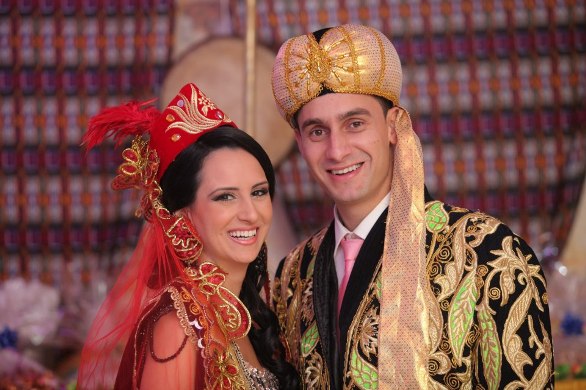
HANDA HANDA 4 (Israel, 2012)
Ronen and Orit have been together for three years. Both of them come from highly respected Bukharan families. Ronen is studying acting at the Nissan Nativ actors studio, and is the star of the Handa Handa theater troupe, which is a big hit among the Bukharan community in Israel and around the world.
The Bukharan community continues to preserve a strict tradition in which people marry after a very brief acquaintance. But Ronen and Orit rebel against their families and refuse to get married. Even the fact that they make every effort to protect Orit’s “honor” is not enough for her parents though. They demand that the couple either gets married or breaks up. And so the love shared by Ronen and Orit is trapped in a conflict between tradition and modernity.
Directors: David Ofek, Neta Shoshani
Production: Lee Yardeny
Production Company: Mytv, Lee Yardeny
Script: Neta Shoshani, Hilla Issacs
Editing: Oded Tabak
Cinematography: Itai Raziel
Research: Orit Fox
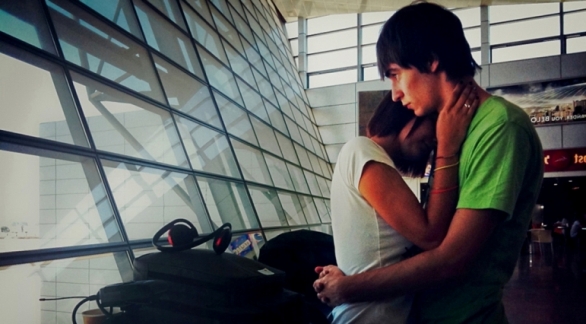
HOUSE OF FUN (Israel, 2012)
Over the course of a year the film’s director, Vitali Krivich, follows a group of young immigrants aged 17-21 at the Karmiel Absorption Center. They left behind family, loves, and personal histories so that they could fulfill the Zionist dream. They now find themselves confronted with a strict rulebook and a commitment to a nine-month program that puts them on some factory assembly line. They enter as “Russians” and will come out “Israelis.”
The director quickly becomes one of them, and they reveal to him and his camera, what is really going on, both within the absorption center and within their young hearts. This allows us to witness the deep rift that is gradually emerging between their idealistic dream and the questions that are starting to surface. “Can Israel really become our home?” “Do they even want us here?” And then there is the most important question of all: “Did we put the natural process of maturing on hold and waste almost a year in an effort to achieve the impossible?” Read more about the process of making House of Fun here, in Midnight East’s interview with Vitali Krivich.
Director & Research: Vitali Krivich
Production: Estee Yacov-mecklberg, Haim Mecklberg
Production Company: 2-team Productions
Script: Vitali Krivich, Doron Suliman
Editing: Vitali Krivich, Ernest Aranov, Doron Suliman
Cinematography: Vitali Krivich, Arie Shusterovich, Daniella Nowitz
Soundtrack & Music: Slava Frenklakh
BEFORE THE REVOLUTION (Israel, 2013)
This is the story of Israelis living in Tehran in 1979, on the eve of the Iranian Revolution. Thousands of Israelis once lived a life of wealth and luxury in Tehran, under the patronage of the Shah, who had an intimate relationship with the State of Israel. Though the corrupt and oppressive regime that harbored them was already starting to collapse, it was almost too late before these Israelis realized that their Iranian paradise was turning into hell.
Using rare 8 mm footage and the testimonies of diplomats, Mossad agents, businessmen, and their wives, this film offers a suspenseful plot that uncovers a new perspective on a revolution that changed the world. This is the story of big dreams, greed, and blindness, and for one Israeli family, the director’s family, of some wonderful days that will never come back.
Director: Dan Shadur
Production: Barak Heymann
Production Company: Heymann Brothers Films
Editing: Nilli Feller
Cinematography: Itai Merom, Itai Neeman
Music: Ishai Adar
THE LAB (Israel, 2013)
Over the last decade, Israel has emerged an international powerhouse in the export of arms and military knowhow, amassed and tested during the Palestinian-Israeli conflict. Military theorists, arms dealers, advisors, and industrialists are reaping unprecedented success throughout the world. The maker of this film follows some of those people, who make their living off of the byproducts of the Palestinian-Israeli conflict. He examines how they do it, what reservations they have about it, and what exactly it is that they are selling.
Director & Script: Yotam Feldman
Production: Yoav Roeh, Aurit Zamir
Production Company: Gum Films, Luna Blue Film, The Factory
Editing: Tal Shefi, Ron Goldman
Cinematography: Philippe Bellaiche
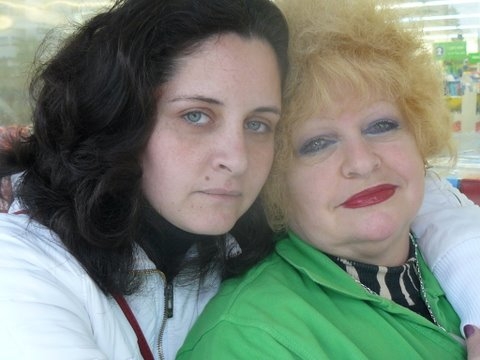
SUPER WOMEN (Israel, 2012)
A glimpse into the lives of five cashiers, who share a shift at a Tel Aviv supermarket. This film takes a look at the past two years, focusing on the relationships between these women, their daily struggle to survive and make a living, their loves, and even their deepest secrets, as they are revealed during cigarette breaks. It is a film about solidarity, support, and the struggle to survive, when faced with the hardships that life presents.
Director, Production, Production Company & Script: Yael Kipper,ronen Zaretzky
Editing: Tor Ben Mayor
Cinematography: Ronen Zaretzky, Avigail Sperber
Music: Eyal Shecter, Menny Barzilay
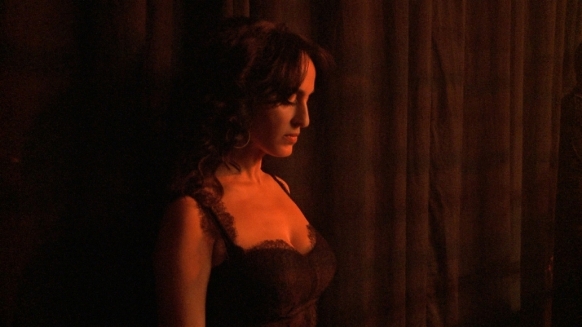
RITA JAHAN FORUZ (Israel, 2012)
Rita Jahan Farouz immigrated to Israel from Iran with her family, when she was eight years old. Now on the eve of her forty-ninth birthday, with enormous tension between Tehran and Jerusalem looming in the background, she is recording her first album in Farsi.
As we watch her release her latest album, we discover an intimate family portrait, with close ties between Rita, her sisters, and their parents. At the same time we also see how much they really miss the country of their birth, which is no longer accessible to them, and how much they long for their extended family, now scattered around the world.
Even Rita, a well-known drama queen, could never have imagined the end of this personal and intimate journey, but one year later, at the age of fifty, she receives an official invitation to perform at the UN building in New York. The warm response she receives from her Iranian fans proves to us what we already knew, even though we often tend to forget it: Countries are made up of individuals, and there is nothing like music to bring them together.
Director & Cinematography: Ayal Goldberg
Production: Vivi Halpern, Orly Topel
Production Company: Kol-miney Productions
Script: Ayal Goldberg, Erez Laufer
Editing: Erez Laufer
DANCING IN JAFFA
Pierre Dulaine, a famous ballroom dancer and instructor, is convinced that dance can bridge social and cultural differences. He puts this belief into practice in a project that brings Jewish and Arab children together in Jaffa, the city of his birth. A magical, life-changing experience awaits everyone who participates in the project.
Director, Script & Research: Hilla Medalia
Production: Hilla Medalia, Diane Nabatoff, Neta Zwebner-zaibert
Production Company: Know Productions, Tiara Blu, Warrior Poets
Editing: Bob Eisenhardt, Philip Shane
Cinematography: Daniel Kedem
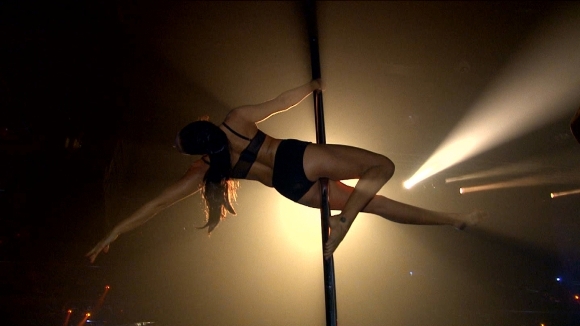
POLE DANCER AND A MOVIE (Israel, 2013)
Legend has it that it all began when pin-up girls showed up at the front lines during World War II, and danced with the metal pole holding up the tents. The real reason story can be found in the towering heels that strippers wore in the 1980s. Back then clubs put up a stainless steel pole so these strippers would have something to hold on to. Then a stripper spun around the pole, another one climbed up it, and yet another turned over on it, and a new dance form was born—pole dancing. Over the past few years, this style of dance, which started off as an effective way to entertain and seduce men, has started winning recognition as a sport, as a genuine form of artistic expression, and as a tool to empower countless women.
The film A Dancer, a Pole, and a Movie documents the life of Neta Lee Levi, European Pole Dancing Champion for 2011. The filmmaker follows her tumultuous journey as she reaches for that coveted title. It reexamines and redefines the relationship between the protagonists of documentary films and the documentary filmmakers, while introducing us to a very frank and tempestuous female artist, caught finding a balance between the traditional, Eastern society in which she was raised, and the conflicting social codes of the Tel Aviv scene, of which she is now a part. She succeeds in doing this without ever apologizing or portraying herself as a victim. In her own unique way, Neta wins praise, but she also pays a steep price. All the while, she shows the audience that even a girl in a skimpy costume and high heels can be made of the same things that other champions are made of.
Director, Production, Production Company, Cinematography & Research: Isri Halpern
Script: Isri Halpern, Joeal Alexis
Editing: Isri Halpern, Michal Tsviboim





